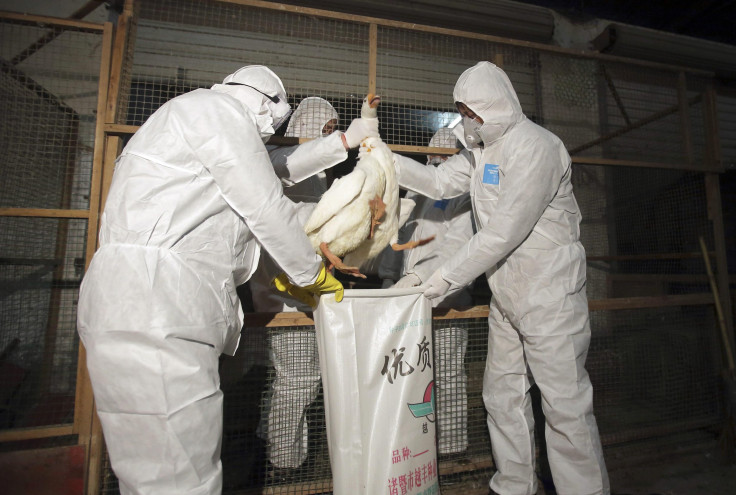China Reports Another H7N9 Bird Flu Death, Bringing Total Death Count To 150

A 38-year-old man who contracted the H7N9 strain of the bird flu died Friday in China’s east Fujian Province, according to Xinhua news service, raising the total death toll to 150. The official state news agency reported that the provincial health and family planning commission confirmed this first human case of H7N9 in Fujian just this morning, although the man, surnamed Zeng, had initially been admitted to the hospital on Wednesday. Earlier this week, China's National Health and Family Planning Commission also confirmed seven additional cases of human infection with influenza H7N9, one of a subgroup of viruses that normally circulates among birds and only recently has been observed in people, according to the World Health Organization (WHO).
An 86-year-old man who had been exposed to live poultry in Shanghai City became ill, and after four days passed, he was admitted to the hospital on Dec. 30. He remains in critical condition, as does a 34-year-old woman from Shaoxing City, Zhejiang Province, who became ill in late December and was admitted to the hospital on Jan. 2.
Other cases of laboratory-confirmed bird flu that occurred in Guangdong Province include: a 47-year-old man from Foshan City who became ill on Christmas day and was admitted to the hospital on Jan. 3, a 71-year-old farmer from Yangjiang City who became ill on New Year’s day and was admitted to the hospital on Jan. 4, and a 51-year-old woman from Foshan City who became ill in late December and arrived at the hospital on Jan. 3. All had been exposed to live poultry, and all are currently in critical condition. In that same southeastern province, a 31-year-old man from Shenzhen City also contracted H7N9, but he is currently in stable condition.
Yesterday, WHO was notified of an additional case in Jiangsu Province, where a 54-year-old woman from Nanjing City became ill after working with live poultry. Admitted to the hospital on Dec. 27, she remains in critical condition. In all cases, the source of infection is under investigation by Chinese health authorities, and no evidence of sustained human-to-human transmission has yet been observed. WHO does not currently recommend any travel or trade restrictions nor does it advise special screening measures for people traveling in and out of China. The health organization supports the Chinese government’s surveillance and control measures.
Earlier this week, the first bird flu death was reported in North America when a Canadian man died after becoming infected with the H5N1 strain. The Alberta man contracted the virus while travelling in Beijing, China. Almost all people infected with this strain of bird flu, which has a mortality rate of about 60 percent, have had close contact with infected birds or H5N1-contaminated environments. Though it can spread to people, it is difficult to transmit from person to person.



























